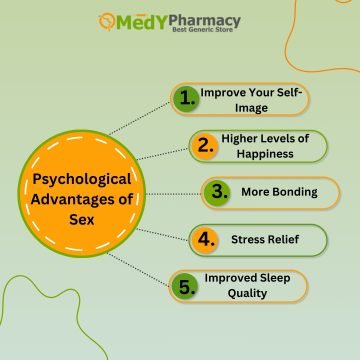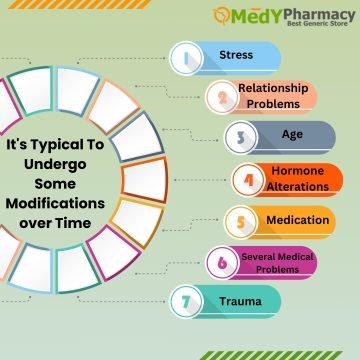Introduction:
With so much discourse about sex in pop culture, online relationship columns, and over cocktails with close friends, it begs the question: how vital is sex in a relationship?
The question may seem even more serious if you are in a relationship where the sex isn’t quite where you or your partner want it to be. Perhaps you’re just curious about it as someone who enjoys sex—or who is completely uninterested in it.
Sexual activity is a kind of bonding that can provide a variety of health benefits to interested parties. Discover how vital sex is in a relationship, whether you’re polyamorous or monogamous.
Even if the health benefits of love-making are evident, the degree of relationship happiness does not change once a certain sex frequency is achieved. This article will explain the health benefits of sex for women and men.
Women! You can now save costly anti-aging products because the study shows that daily sex with your hubby can remove at least seven years from your face! As a result, the advantages of regular sex become even more important.
Similarly, there are numerous sex advantages for men in marriage. It can help them lose weight, sleep better, and increase happiness, longevity, good health, and well-being.
These are complicated and distinct, and even the most typical relationship issues seem different for each couple. Sex problems, especially misaligned sex expectations, are very personal and incredibly frequent.
This can be an awkward topic to address, but when sex ends in a relationship, it can lead to confusion and hurt if these gaps are left to assumption rather than being filled via talk. Partners who do not have adequate communication and clear expectations may experience problems with their sex life, or lack thereof.
Why Does Sex Matter in Relationships?
Yes. Sex isn’t always needed. However, it can play a crucial role in a good and fulfilling relationship.
Some people may believe that being in a sexual relationship is necessary. Others may believe that other forms of intimacy and connection are more vital.
- Feeling close to your lover
- Expressing affection towards your partner
- Finding sex fun
- Desire to have children.
- Feeling confident and attractive
- Reducing stress
According to research, having regular intercourse can benefit a person’s overall health. Having sex is typically associated with increased affection.
How Important Is Sex in a Relationship?
This is a physical bonding activity that can be beneficial in many types of relationships, including monogamous, polyamorous, and open couples, because it can promote emotional connection, boost each partner’s self-image, and relieve stress.
Avoid seeking a one-size-fits-all approach to sex in a relationship; you can have a strong, healthy relationship no matter how much sexual activity you have. While many people require frequent sexual activity to have a good love connection, many others—including sexual and those with low libidos—have deep and meaningful relationships without relying on sex.
If at least one person in the partnership desires sex, partners must endeavor to have a mutually satisfactory sex life. Many studies have revealed a link between sexual happiness and relationship satisfaction, so both people must feel good about their sex lives and resolve any issues that arise.
She adds that troubles in the bedroom tend to influence how people perceive their relationship as a whole. When a couple’s sex is going well, it feels like it accounts for around 20% of their relationship’s success. It is significant, and it contributes to their happiness, but only in proportion to the other aspects of their lives. However, when it doesn’t work, it can feel like they spend 80% of their time together. It can overshadow other sections that may be functioning properly. So sex becomes more crucial as things go wrong.
Sex Isn’t Necessary.
People don’t want to have sex for a variety of reasons. This could include:
- Having low libido
- Having an underlying medical issue, such as persistent pain
- Desire to date for a longer amount of time before having sex
- Being unmarried and wishing to abstain from sexual activity before marriage
However, this does not necessarily imply that the connection will be unhealthy. It is not a sign that your companion does not love or value you!
Finally, what is the conclusion? This is not required for a successful relationship.
However, It May Be Important For Some
Other people consider this a crucial aspect of romantic partnerships. Many people wish to have sexual contact with their loving partner.
Sexuality exists on a continuum. Asexual persons have little to no sexual interest (and normally do not have sex, though this varies by individual), whereas allosexual people do.
Because our sentiments about sex and our capacities for sexual attraction fluctuate so greatly, we all take different approaches to sex — but no method is bad.
There Are Numerous Explanations for This
There are numerous reasons why sex could be a vital aspect of your relationship.
- It could be an opportunity for you to become closer to your companion.
- It could be an opportunity to express love and affection to your lover.
- You may feel more confident in your relationship if you have sex regularly.
- It could simply be enjoyable and entertaining.
- You could be attempting to conceive.
Relationship Sex Benefits
Aside from the personal rewards for you and your spouse, regular sex promotes a good relationship in a variety of ways. For example, the oxytocin released during intercourse promotes bonding and emotional closeness.
Sex in a monogamous relationship deepens your commitment and emotional connection to the other person. Expressing love through sex enhances the chances of a couple remaining together. As a result, there is a favorable relationship between sex and lower divorce rates.
- Stress levels were reduced.
- Better sleep
- Release of oxytocin, which promotes bonding.
- Other “feel-good” chemicals such as dopamine are released.
- Helps to strengthen the pelvic floor muscles.
- Encourages deeper commitment in partnerships.
- Encourages relationship happiness.
Bad sex that is forced, painful, angry, hostile, or worse will not benefit you.
And Other Advantages Come With Regular Sexual Engagement
This has many benefits beyond pleasure, and there are numerous reasons why having sex is excellent for your brain, body, and relationship.
- Emotional
Many people have emotional reasons for engaging in sex. Sex provides a multitude of emotional benefits.
- It could boost your self-esteem.
- It may allow you to connect with your own body pleasantly.
- It could help you bond with your mate while also expressing your love and caring for them.
- It can help to reduce stress.
- Physical
Sex can be beneficial to your physical health as well. According to some studies, sex can:
- Enhance immunological function. People with more frequent intercourse have stronger immune systems.
- Be a light type of exercise. Having sex provides a surprising amount of exercise.
- Enhance heart health. Having regular intercourse may lower your risk of acquiring heart disease.
- Boost cognitive function. Sexually active persons aged 50 to 90 have improved memory.
- Treat headaches. Sex can alleviate migraines and cluster headaches.
This does not imply that people who abstain from sex would inevitably become physically unwell or struggle emotionally; rather, persons who have sex may notice improvements in other areas.
These advantages should not be used to pressure people into having sex if they do not want to.
Sex can cause intimate feedback Loop.
I believe there is a link between regular sexual engagement and general well-being.
It also demonstrates how sex predicts affection, which predicts the frequency of sexual behavior. In other words, more sex causes more sex.
So, if you want to have sex, the best thing you can do is have more! It may seem stupid, but it can eventually increase your sex drive and general sex life.
Psychological Advantages of Sex

- Improve Your Self-Image
Sex can enhance self-esteem and lessen insecurity, resulting in a more positive self-image.
- Higher Levels of Happiness
More consenting and high-quality sex increases happiness.
- More Bonding
Endorphins, which reduce irritation and depression, are among the brain chemicals released during sex. Another hormone, oxytocin, rises with nipple stimulation and other sexual activity. Oxytocin promotes a sense of peace and contentment.
- Stress Relief
Chronic stress may cause decreased sexual activity. Sexual activity, on the other hand, can be an effective stress reliever. Sex lowers stress response hormones such as cortisol and adrenaline, with benefits that extend far into the following day.
- Improved Sleep Quality
Prolactin, a hormone that facilitates sleep, is released during orgasms.
Physical Advantages of Sex
It’s easy to see how sex enhances emotional health, but there are also several physical benefits to sex.
- Improved Physical Fitness
This is a sort of exercise. This is the equivalent of moderate physical activity, such as brisk walking or ascending two flights of stairs. Women’s bladder control increases with increased muscle tone.
- Improved Brain Function
Preliminary research on rats indicated that more frequent intercourse was associated with improved cognitive function and the development of new brain cells. Human studies have since shown similar effects. Sex has been linked to improved memory performance in persons over the age of 50.
- Improved Immune Function
Increased sexual activity improves immunological function. Regular sex may even lessen your risk of contracting a cold or the flu.
- Lower Pain Levels
Sex produces endorphins that create more than just a sensation of well-being and tranquility.
- Weight Loss
The pleasurable brain chemicals released during sex can reduce food cravings and aid with weight loss.
- Positive Cardiac Effects
Penile-vaginal sexual action has been linked to reduced systolic blood pressure. Sexual activity dilates blood vessels, which increases oxygen and nutrient delivery throughout the body while lowering blood pressure.
- Additional Physical Advantages
Increased sexual activity enhances desire and vaginal lubrication. Frequent intercourse is linked to lighter menstrual cycles and fewer unpleasant period cramps. Furthermore, the release of the hormone DHEA during orgasm may be associated with an increased sense of smell, healthier teeth, better digestion, and beautiful skin.
However, Sex Is Not the Only Technique to Achieve Intimacy with Your Spouse
We frequently associate sexual activity with intimacy. While sex can be a wonderful form of intimacy, it is far from the only way to be personal with another person.
Affectionate touch, for example, can be an excellent method to feel intimate.
- Massages
- Kissing
- Cuddling
- Holding Hands.
Beyond physical intimacy, and emotional intimacy, frank, candid interactions, can be vital in many people’s relationships.
One Thing Is For Sure: Sexual Compatibility Is Vital
It can be tough to deal with a situation in which one person believes that sex is necessary in a relationship but the other person does not want to have it.
Similarly, it can be problematic if one person has a high libido but the other has a low libido.
It is, however, manageable. Communication can be quite beneficial.
Some people feel that practicing ethical non-monogamy allows them to meet their sexual demands without jeopardizing their connection with their nonsexual partner.
Is It Healthy To Have Sex Every Day?
This is fine and good for your health. Make love, love one another, and live joyfully.
Sex meets your bodily requirements while also establishing an emotional connection between the two individuals in a relationship. Women place a greater emphasis on emotional connection than men do.
This has numerous advantages, but it should not be a daily and mandatory part of life. It is acceptable for you to limit the amount of times you have sex every day or week.
This is because it is not always possible for both parties to desire to have sex at the same time or at the same frequency. Furthermore, the willingness of both participants enhances the sexual act’s gratification and enjoyment. Sexual coercion is the practice of forcing someone to have sex. It is not recommended.
The Ideal Sex Frequency in a Relationship
According to one study, increased frequency correlates with higher sexual pleasure in both men and women. However, no single number is universally applicable. Because libidos are rarely equal, the ideal frequency is typically an average of each person’s libido. Sexual frequency, like everything else in a partnership, must seem equitable to both partners.
However, if one of you believes that frequency is a source of concern in your relationship, you should set aside time to address what the expectations are and any hurdles to meeting one another’s needs in this area.
What Defines A Healthy Relationship?
- Compassion and kindness.
- Dependability and dedication.
- Mutual regard for boundaries.
- The ability to work as a team.
- Similar ideals and goals.
Having similar beliefs and aspirations is likely to be the tipping point for most relationships, as they serve as the foundation for practically everything else.
Everyone’s needs fluctuate according to their individual experiences. For example, it may be significant for someone to have a spouse who is engaged in volunteering and community service, yet in other partnerships, this may be less relevant. Someone who comes from a close-knit family and values family gatherings around the holidays may struggle to date someone who does not value family.
Before beginning a new relationship, you must first engage in some self-reflection. Even if you’ve been dating someone for a while, the healthiest relationships allow for self-reflection, build on past mistakes, and allow everyone to handle disagreements in a safe, productive, and helpful manner.
Every relationship will have difficult periods, but I believe that how you deal with them is what is important.
These Aspects of a Relationship Are More Vital Than Sex
Of course, this is a crucial part of a relationship. Couple relationships are frequently strained owing to a lack of sex. However, other factors must be addressed to maintain a successful partnership. Let’s look at them.
- Maintain Open Communication
Be free and open with your companion. To gain a deeper understanding, share as much information as possible and exchange thoughts frequently. For long-term satisfaction, the connection should be as close as possible without limiting each other. Our unwritten restrictions and attitudes regarding some things convey a restrictive message to our companion. If there is open communication, such obstructions will not have an impact on the connection.
- Happiness Relationships
Mutual satisfaction is a crucial aspect of any relationship. Happiness is incomplete unless it is fully enjoyed by your lover. Become conscious of your happiness and share it with your companion. Explain your feelings and why they make you feel this way. This pleasure is doubled when shared and enjoyed jointly.
- Sticking Together
We don’t mean you have to do everything together. Every person in the world differs in some ways from others. Our companion usually has a wide range of interests. Even if you have no interest in the genre, you may always assist your partner. You can prioritize your partner’s ideas and interests. A connection requires reciprocal support.
- Befriend Your Partner
People frequently recommend that you marry a buddy. No relationship problems would arise if you could work as a team and cooperate as best friends.
- Relationship Is Trust
It is tough to trust your partner if you have infidelity concerns. However, if there is any doubt that your spouse will cheat on you in the long run, this is an issue. Blind faith can be beneficial for both. In a partnership, trust is essential.
If there are any infidelity difficulties, it is best to talk about them honestly. Arguments will not operate at all. An argument involves emotions, whereas a debate is about sharing information. If it becomes difficult for you to trust your partner and manage the tensions, seek the advice of a psychologist or relationship therapist.
- Gifting New Experiences
It is typical to feel nervous throughout the early stages of a relationship. However, as the days pass, this feeling becomes increasingly feeble. We start taking our partner’s existence for granted. With this, we don’t feel like making an extra effort to make the evenings memorable. However, surprising the partner with tiny gifts on occasion, as well as offering new experiences, can reinvigorate the relationship.
- Continue To Listen
Empathy for your partner is essential for a fulfilling connection. When you disagree, attempt to see things from your partner’s point of view. It allows you to better comprehend what they mean when they say something. Listening more is a wonderful practice for building a stronger relationship. Also, instead of debating your point, express it quietly, logically, and analytically to ensure that your partner understands.
- Laugh Together
Spending quality time with your loved ones will improve your mental health and efficiency. Having fun with your family or partner can help you bond better. Make it a point to keep things lively and active when you are present. It is critical to keep the people in our lives satisfied. And when you share laughter, those moments become brighter.
- Do Not Take Them For Granted
People believe that once they enter a committed relationship, their partner will always be there for them. Giving priority to a partner’s profession and other concerns might often lessen their desire. And this gradually leads you down a different path, which might cause gaps in a partnership. As a result, it is critical to express gratitude for their presence in your life. Developing thankfulness can help you see their point of view more clearly. Such knowledge maintains the relationship’s health.
- Apologize When Needed
Many couples quarrel because of ego problems. If an argument erupts and a person realizes deep down that they may have made a mistake, they should apologize. This apology does not have to be so grandiose. Rather, it ought to be analytical. You can clearly describe why you felt this way and what transpired. Similarly, the partner should be able to patiently wait and listen to understand and approve the apology. The relationship suffers when the ego interferes and no one wants to take a step back.
Incompatibility May Not Work In the Long Term
Some people don’t mind waiting for a partner’s libido to recover. Others do not mind satisfying their partner’s libido and sexual cravings while having little to no sex.
Some people may struggle with a lack of sex in the long run. It might be difficult to manage this when sex is extremely essential to you but not to your partner.
So, if you and your spouse appear to be sexually mismatched, talk about it. It may be possible to resolve the problem so that you are both content.
Issues with Regular Sex
Can be vital in a relationship; nevertheless, certain things can make being a sexual couple more difficult. Age, hormones, children, stress, physical concerns, and marital challenges can all influence how often couples have sex.
Age frequently influences sex frequency, owing to declining sex hormone levels as people age. Maintaining an active sex life can be difficult or impossible owing to physical or psychological issues.
Humans are programmed to seek the intimacy of sex. Individuals in a relationship who do not have sex may become distant and look elsewhere. Working with a competent couple’s therapist can help close this gap and prevent problems from recurring throughout your marriage.
It’s Typical To Undergo Some Modifications over Time
A variety of factors can cause your libido to alter over time.

- Stress
Stressful events and lifestyles may reduce your sexual urges.
- Relationship Problems
Arguments, and a lack of trust may result in a decreased libido.
- Age
Your libido may alter with age.
- Hormone Alterations
Menopause, pregnancy, and other events create hormonal changes that can impact your libido.
- Medication
Many drugs have libido changes as an adverse effect.
- Several medical problems.
Arthritis and coronary artery disease, for example, are associated with a reduced sexual drive.
- Trauma.
Traumatic situations induce psychological stress, which can affect libido.
If a low libido bothers you, consult your doctor or another healthcare expert.
Not wanting sex does not imply that something is wrong with you, and it is not always a problem to solve unless it causes you discomfort.
Underlying clinical causes of low libido are frequently treatable, and you may discover that your libido gradually recovers to its previous state. There are also a few natural techniques to increase your libido.
How to have more sex
Sex frequency can and can fluctuate over time. However, this does not imply that sex frequency must continue to decline.
If you’re wondering if sex can be as good as it was when you first fell in love, the answer is: definitely. As your relationship progresses, your sex and closeness will improve. It could simply necessitate some additional effort.
Sex Is Hotter When Joint Adventure, Not a Negotiation
Scorekeeping has no place in a good sexual experience. Couples with a desire disparity may enter a dynamic in which sex is about who gives in and how often, resulting in very unpleasant you-versus-me energy around sex.
Sex should be about exploring and making each other happy. If you believe your relationship is stuck in a negative sex cycle, talk to your partner about it and work together to find mutually agreeable solutions.
Negotiating sex can elicit strong feelings of rejection, alienation, and guilt. These are strong emotions, and it may be beneficial to consult with a sex therapist or educator who can assist you in talking it out, clearing the air, and returning to a more positive state of mind.
What matters is that you find a partner who understands your needs and desires, regardless of how complex they may be. Every romantic and sexual connection relies on open and honest communication.
Consider speaking with a couple’s counselor or Medypharmacy Sites. They can assist you in communicating with your partner and working together to solve the problem.
























